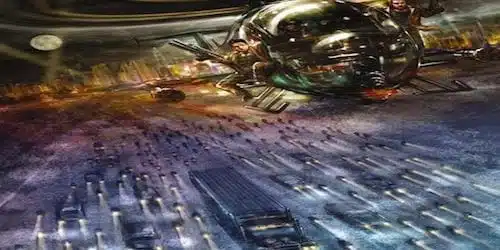
Switching between CNN and Bloomberg this last week, there’s a certain and elegant weight that comes to rest on Michael Lewis’ most recent offering. The extended title really does seem to give the game away; Inside the Doomsday Machine. Between street riots in London (London!) and the massive selloff following Standard & Poor’s downgrade of the US Treasury, it really does seem like a forced march to A Very Definite End.
Lewis, in his introduction, describes with the skill of a professional observer the horror of witnessing the infrastructural collapse of Wall Street while working at an investment bank during the 80s. The horror is seeing the high life of piracy play out as deals are brokered with other people’s, with little thought to the consequence that must logically follow.
It seems like an old story by now, one we’re almost intimately familiar with, but it is also it is the kind of story that puts the world of Cirulnick & Manpearl’s Earp: Saints For Sinners just that little bit closer.
Creators Matt Cirulnick and David Manpearl have conceived of a world that is entirely plausible and seems to become more so with every passing second. What if, they posit, credit is decommissioned and cash is king once more? Towns like Las Vegas would become boomtowns again. And law would reorganize, Cirulnick & Manpearl contend. US Marshals would have shootouts on streets and heists would be the order of the day yet again.
But any work done to resurrect the social context of the 1880s is simply cosmetic to Cirulnick and Manpearl’s real work. In constructing a fictional context for Wyatt Earp’s story to play in the early days of the 21st century, Circulnick & Manpearl have once more put the legend of Wyatt Earp on the cultural agenda.
It’s easy to get lost in the cowboyism of Wyatt Earp’s career. He makes a living hunting buffalo where he meets other Old West legends like Bat Masterson. As a Deputy US Marshal he cleans out Dodge City almost singlehandedly. He has that legendary shootout at the OK Corral in Tombstone.
But focusing on the cowboy in Wyatt’s career misses out on the incredible relevance he has to our current political and socioeconomic situation. Wyatt was motivated by a deep need to secure a livelihood for himself and his family (he was one of seven brothers) in times of incredible uncertainty. His time in Tombstone, AZ, although coming after he firmly established himself as a major player in the Old West, is the beginning of a second career, rather than the end to his first.
In Tombstone he had become a hotel owner and a prospector, looking to mine silver. Wyatt believed his days as lawman and gunfighter to truly be behind him. It was his clash with local cattle barons that highlighted the systemic breakdown of law and order in Tombstone. And it was this breakdown that drove him to once again put on the US Marshal’s badge.
Wyatt Earp is the story of one man awash in a broken system. The elegance of Cirulnick’s narrative arc which concludes in Earp: Saints for Sinners #4 and the eloquence of Zachary Sherman’s connects Saints for Sinners with the emotional core of Earp with “Alice in Wonderland” of a Michael Lewis still reeling from a Wall Street exploded to unimaginable levels.
And the true end to Wyatt’s career, his relocation to the nascent Hollywood and his socializing with actors of the day isn’t missed by Cirulnick & Manpearl either. Wyatt fades into legend, he becomes adopted by cowboy actors like Tom Mix as the authentic model for an Old West gunfighter.
Just as Wyatt’s appearance in Los Angeles signals at least one possible birth of our modern entertainment industry, Circulnick & Manpearl use Wyatt’s own narrative to signal the birth of an evolution in entertainment. Radical Studios’ push into transmedia, a push that sees Sam Raimi direct the upcoming summer blockbuster based on Earp: Saints for Sinners, might be exactly the thing to push into a new kind of generative economy.
It’s hard not to read Sherman’s carefully scripted showdown between Earp, Jesse James and the Pinkertons and not at least feel like there’s still some action left. Blasted by gunfire on all sides as Wyatt braves the abandoned Air Force base where the Pinkertons are holed up, it’s hard for my not to recall the opening of Jefferson’s letter to John Adams on the Natural Aristocracy.
Jefferson writes: “I agree with you that there is a natural aristocracy among men. The grounds of this are virtue and talents. Formerly, bodily powers gave place among the aristoi. But since the invention of gunpowder has armed the weak as well as the strong with missile death, bodily strength, like beauty, good humor, politeness among other accomplishments has become but an auxiliary ground for distinction”.
If anything, this quote betrays Jefferson’s intuition that technology might be the engine of social change, but that undaunted spirit will always remain at society’s core. With the fiction of Cirulnick and Manpearl presented by way of a Radical publication, I’m left feeling like I’ve read a manifesto on what entertainment in the 21st century might yet become.
